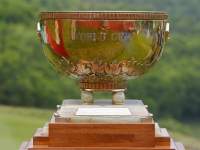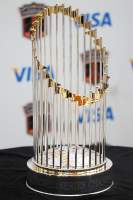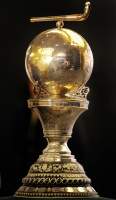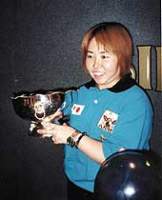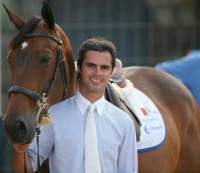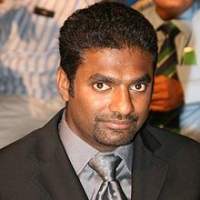Rahul Dravid
About Rahul Dravid
Rahul Dravid(About this sound pronunciation (help·info); born 11 January 1973) is a former Indian cricketer and captain, widely regarded as one of the greatest batsmen in the history of cricket.Born in a Marathi family, he started playing cricket at the age of 12 and later represented the state team at the under-15, under-17 and under-19 levels. Hailed as The Wall, Dravid was named one of the best five cricketers of the year by Wisden Cricketers' Almanack in 2000 and received the Player of the Year and the Test Player of the Year awards at the inaugural ICC awards ceremony in 2004.In December 2011, he became the first non-Australian cricketer to deliver the Bradman Oration in Canberra.
As of October 2012, Dravid is the fourth-highest run scorer in Test cricket, after Sachin Tendulkar, Ricky Ponting and Jacques Kallis, and is only the second Indian cricketer, after Tendulkar to score 10,000 runs both in Tests and in ODIs.In 2004, after completing his century against Bangladesh in Chittagong, he became the first and the only player till date to score a century in all the ten Test-playing countries.As of October 2012, he holds the record for the most number of catches taken by a player (non-wicket-keeper) in Test cricket, with 210.
In August 2011, after receiving a surprise call in the ODI series against England, Dravid declared his retirement from ODIs as well as Twenty20 International (T20I), and in March 2012, he announced his retirement from international and first-class cricket. He appeared in the 2012 Indian Premier League as captain of the Rajasthan Royals.
Rahul Dravid, along with Glenn McGrath were honoured during the seventh annual Bradman Awards function in Sydney on 1 November 2012.Dravid has also been honoured with the Padma Bhushan award, India's third highest civilian award.
In 2014, Rahul Dravid joined the GoSports Foundation, Bangalore as a member of their board of advisors. In collaboration with GoSports Foundation he is mentoring India's future Olympians and Paralympians as part of the Rahul Dravid Athlete Mentorship Programme.Indian badmiton player Prannoy Kumar, Para-swimmer Sharath Gayakwad and young Golfer Chikkarangappa S. was part of the initial group of athletes to be mentored by Rahul Dravid.
Rahul Dravid Achievements
Padma Bhushan-2013:
The Padma Bhushan is the third highest civilian award in the Republic of India, after the Bharat Ratna and the Padma Vibhushan, but comes before the Padma Shri. It is announced on the occasion of Republic Day every year. It is conferred by the President of India at a function held at Rashtrapati Bhavan sometime around March/ April.
Padma Shri-2004:
Padma Shri (also Padmashree) is the fourth highest civilian award in the Republic of India, after the Bharat Ratna, the Padma Vibhushan and the Padma Bhushan. It is awarded by the Government of India. The award is announced every year on Republic Day
Sir Garfield Sobers Trophy-2004:
The Sir Garfield Sobers Trophy is a cricket trophy awarded annually by the International Cricket Council to its chosen world player of the Year. It was first awarded in 2004 to Rahul Dravid.
The trophy is handcrafted by leading international crystal manufacturer Swarovski. The design features a red crystal cricket ball studded with over 4200 Swarovski crystal chantons, resting on a brass hand extended from a gold-plated base.
The trophy is named after former West Indies cricket captain Sir Garfield Sobers, whose name was chosen by a panel consisting of Richie Benaud, Sunil Gavaskar and Michael Holding. They were asked by the ICC to select "an individual with whom to honour cricket's ultimate individual award"
Wisden Cricketers of the Year-2000:
The Wisden Cricketers of the Year are cricketers selected for the honour by the annual publication Wisden Cricketers' Almanack, based primarily on their "influence on the previous English season".The award began in 1889 with the naming of "Six Great Bowlers of the Year",and continued with the naming of "Nine Great Batsmen of the Year" in 1890 and "Five Great Wicket-Keepers" in 1891.
Since 1897, with a few notable exceptions, the annual award has recognised five players of the year. No players were named in 1916 or 1917, as the First World War prevented any first-class cricket being played in England, while in 1918 and 1919 the recipients were five schoolboy cricketers.From 1941 to 1946, the Second World War caused the same issue and no players were named. Three players have been sole recipients: W. G. Grace (1896), Plum Warner (1921) and Jack Hobbs (1926). The latter two selections are the only exceptions to the rule that a player may receive the award only once. Hobbs was first recognised in 1909, but was selected a second time in 1926 to honour his breaking W. G. Grace's record of 126 first-class hundreds;Warner was first honoured in 1904, but received a second award in 1921 for his last season in first-class cricket, when he led Middlesex to a County Championship win.John Wisden, cricketer and eponymous founder of the almanack, was featured in a special commemorative section in the Jubilee edition of the publication in 1913, 29 years posthumously.
From 2000 to 2003 the award was made based on players' impact on cricket worldwide rather than just the preceding season in England,but the decision was reversed in 2004 with the introduction of a separate Wisden Leading Cricketer in the World award.
Arjuna Award for Cricket-1998:
The Arjuna Awards are given by the Ministry of Youth Affairs and Sports, government of India to recognize outstanding achievement in National sports. Instituted in 1961, the award carries a cash prize of INR 500,000, a bronze statuette of Arjuna and a scroll.
Over the years the scope of the award has been expanded and a large number of sports persons who belonged to the pre-Arjun Award era were also included in the list. Further, the number of disciplines for which the award is given was increased to include indigenous games and the physically handicapped category.
The Government has recently revised the scheme for the Arjun Award.As per the revised guidelines, to be eligible for the Award, a sportsperson should not only have had good performance consistently for the previous three years at the international level with excellence for the year for which the Award is recommended, but should also have shown qualities of leadership, sportsmanship and a sense of discipline.
ICC Awards:
Player of the Year-2004











